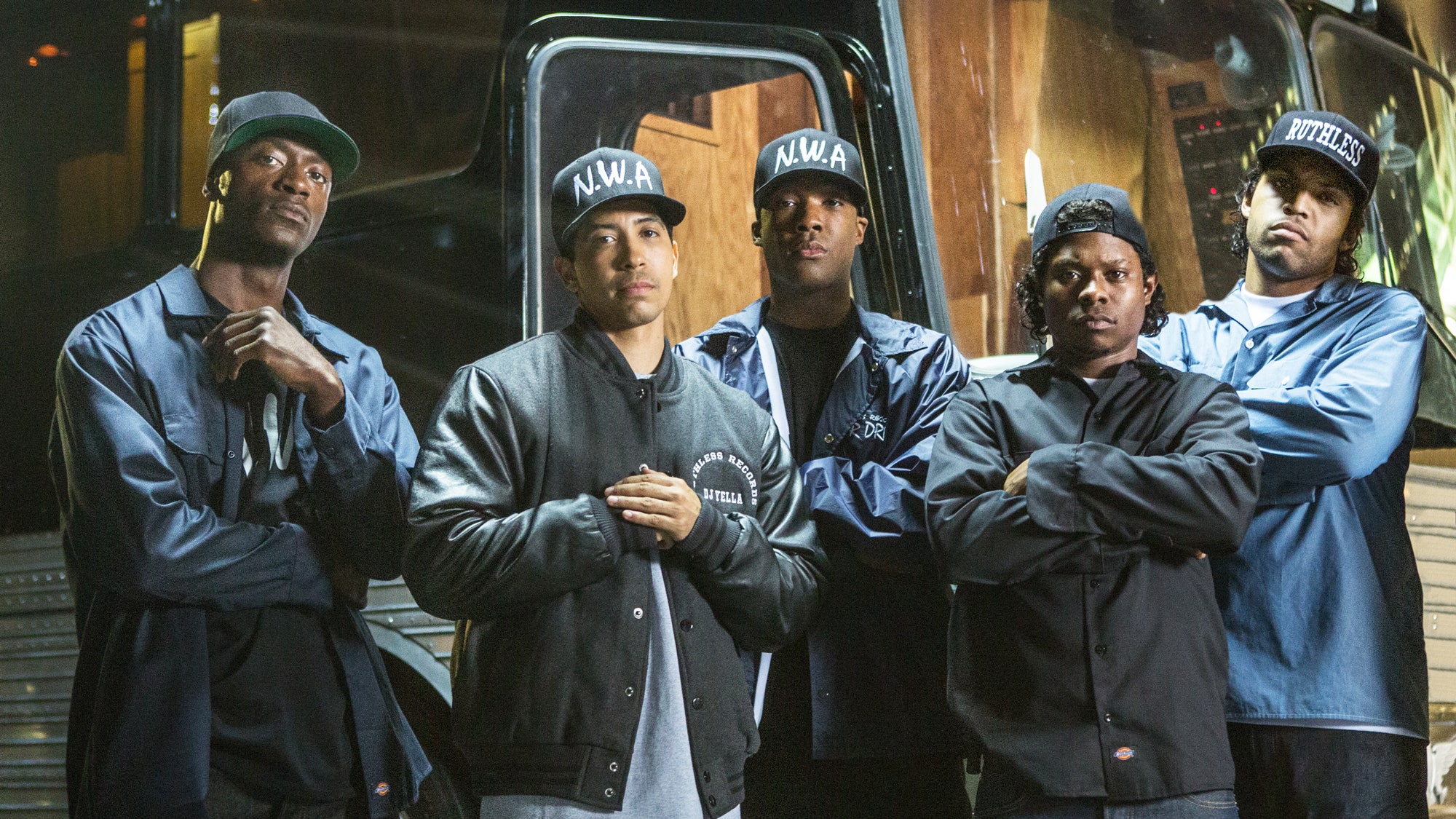The exhilaration of Straight Outta Compton, one of the year’s best movies, is that of a good story, well-told with vivid performances and a stirring, contemporary sociopolitical context. Charting the rise, fall and rise of seminal hip hop forerunners N.W.A., director F. Gary Gray has fashioned the most involving biopic in ages, one that shows us gifted young musicians driven by storytelling that reflected their ‘hood, L.A.’s rough and tumble Compton, a place of drugs, gangs and dirty cops that inspired their most famous song, “F*ck the Police,” here given an all-too-familiar modern relevance.
Produced by Dr. Dre and Ice Cube, who presumably ensured authenticity, and directed by Gray with speed and energy to spare, Straight Outta Compton is an ambitious saga charting the rise of gangsta rap forerunners N.W.A. (Niggaz Wit Attitudes), borne from a seminal 1986 moment where Compton neighborhood kids Ice Cube (O’Shea Jackson, Jr.), Dr. Dre (Corey Hawkins), Eazy-E (Jason Mitchell), MC Ren (Aldis Hodge) and DJ Yella (Neil Brown, Jr.), capitalized by E’s flush drug money, hit the studio and formed Ruthless Records. They had hit, but then what?
Enter promoter and manager Jerry Heller, played with brio by Paul Giamatti, who not only saw the potential to turn N.W.A.’s raw talent into a huge windfall, but also aligned himself with the group’s rising star, Eazy-E, bankrolling him while keeping the others at bay during a successful national tour, performances from which comprise the film’s delirious first half, culminating in a Detroit showdown with keystone cops whose warnings to steer clear of their signature song naturally go unheeded.
In the picture’s second half—after N.W.A. reaches its apex with bestselling records, a national following and all the hedonistic hotel orgies money can buy—things begin to quickly self-destruct over artistic and monetary disagreements, the latter splitting the group and sending Dre and Cube into their own massive solo careers. While Dre teams up violent, threatening former bodyguard Suge Knight (R. Marcos Taylor in a frightening impersonation) to form Death Row Records (including scenes with actors playing the late Tupac Shakur and Snoop Dogg), Cube skyrockets as a solo artist with success on the charts and onscreen in Boyz n the Hood and Friday. Meanwhile, E’s implicit trust of Heller takes him down quite a path of excess, and eventually ruin. In the film’s final third, he reconnects with Cube and Dre for a proposed reunion album, but fate intervenes.
One of the great strengths of Compton’s screenplay, written by Jonathan Herman and Andrea Berloff, is that it doesn’t pull punches in underlining ugly modern parallels between comprehensive news footage of the Rodney King beating and its subsequent acquittals and aftermath, impressively recreated on L.A.’s streets, further driving the point home in scenes of numerous illegitimate arrests and harassment from Compton cops, capturing the zeitgeist of Ferguson, Michael Brown, Sandra Bland and scores of others tragedies. Director Gray adeptly integrates this theme into his rags-to-riches epic, giving the film an immediate contextual framework.
The performance are uniformly excellent, and Jackson, playing real-life dad Ice-Cube, is open and quite winning in his pursuit of both fairness and friendship. But it is the breakout, novice New Orleans actor Mitchell who walks away with this movie, peeling back the gangsta rap persona to reveal a tender and kind kid who realizes, too late that friendship is what really mattered. As E wrestles with AIDS and mortality in the film’s final scenes, bravado stripped, Mitchell;s vulnerability pays off in generous, unexpected ways. If there is any fairness come Oscar season, his fully-felt performance will be remembered with a deserved Best Supporting Actor nod (though in my book he is Compton’s lead).
And then there’s Giamatti, terrifying in Love & Mercy as the manipulative doctor, here delivering some sensational moments, bravely defending his group from racist cops, comically railing against Cube’s anti-Semitic solo lyrics and ever a slickster right to his his final heartbreaking scene with E.
In the final analysis, Straight Outta Compton depicts the birth of a cultural shift in music and a tale of success writ large, deftly balancing an equally compelling personal story—and that makes the picture a real American epic.
4 stars.



